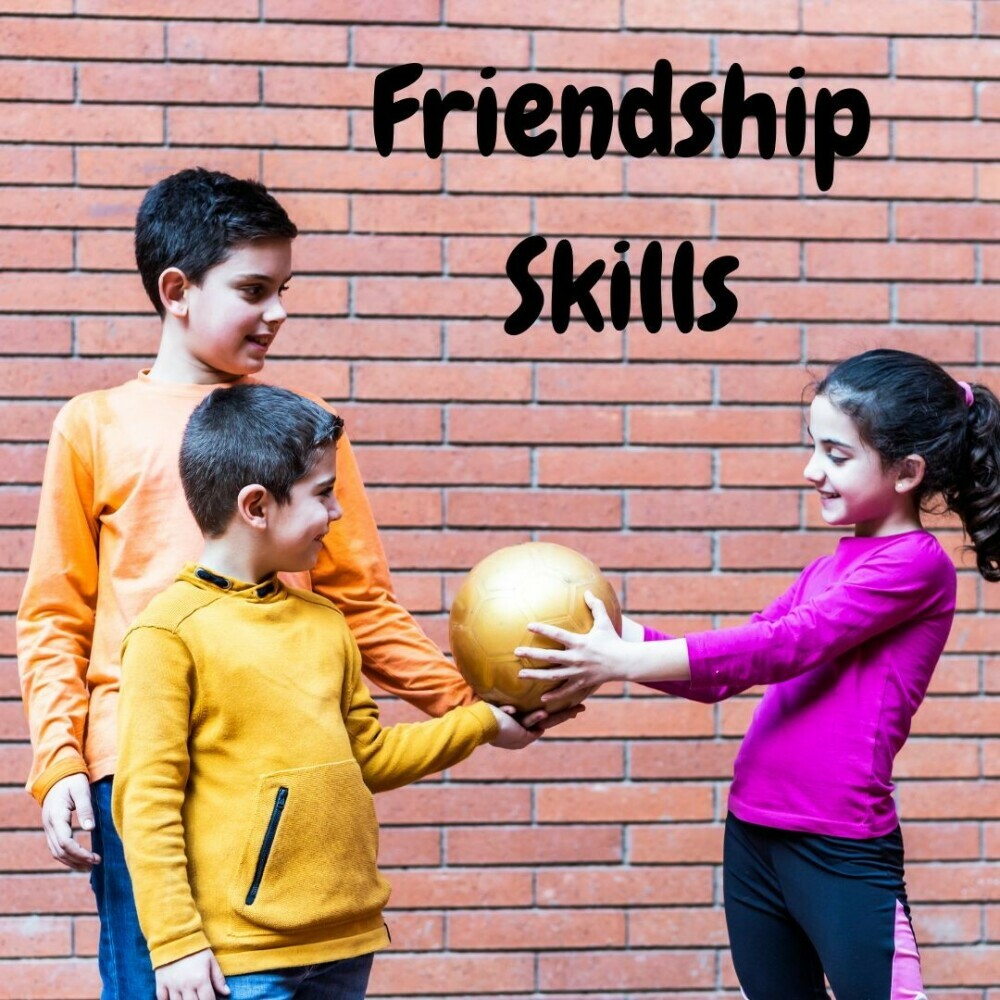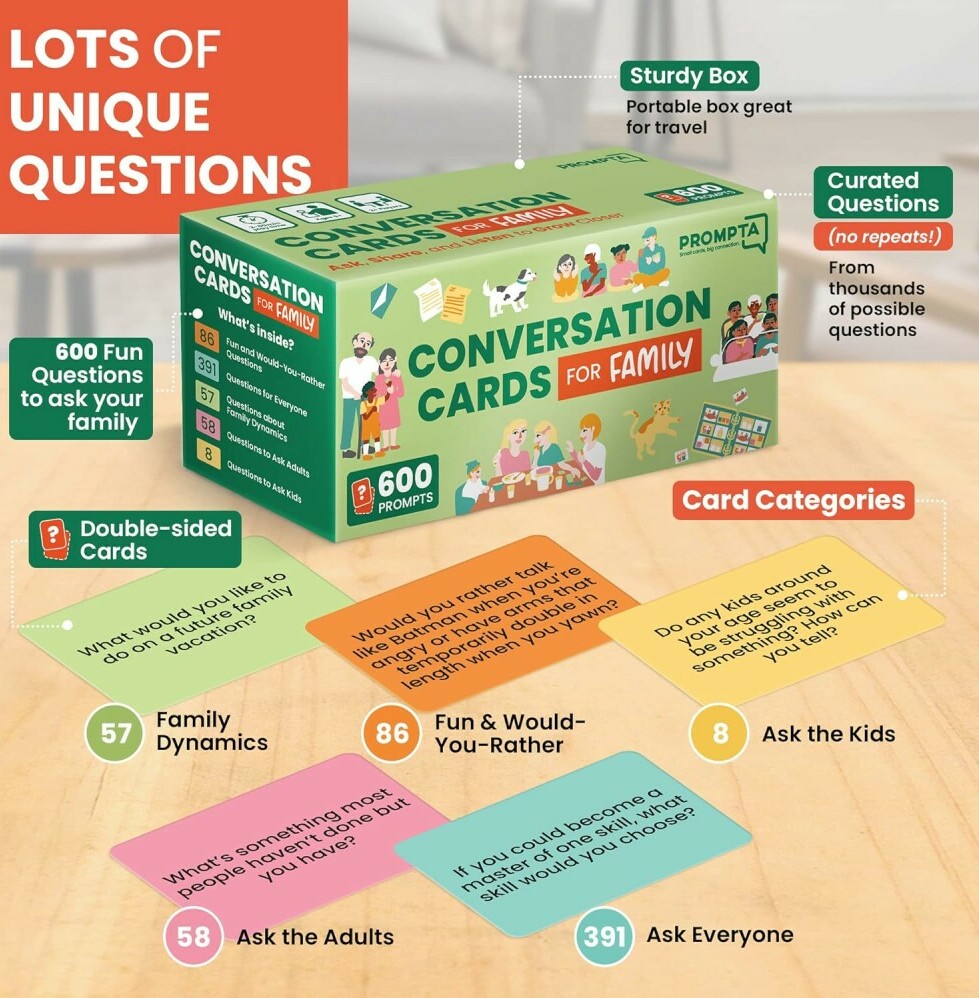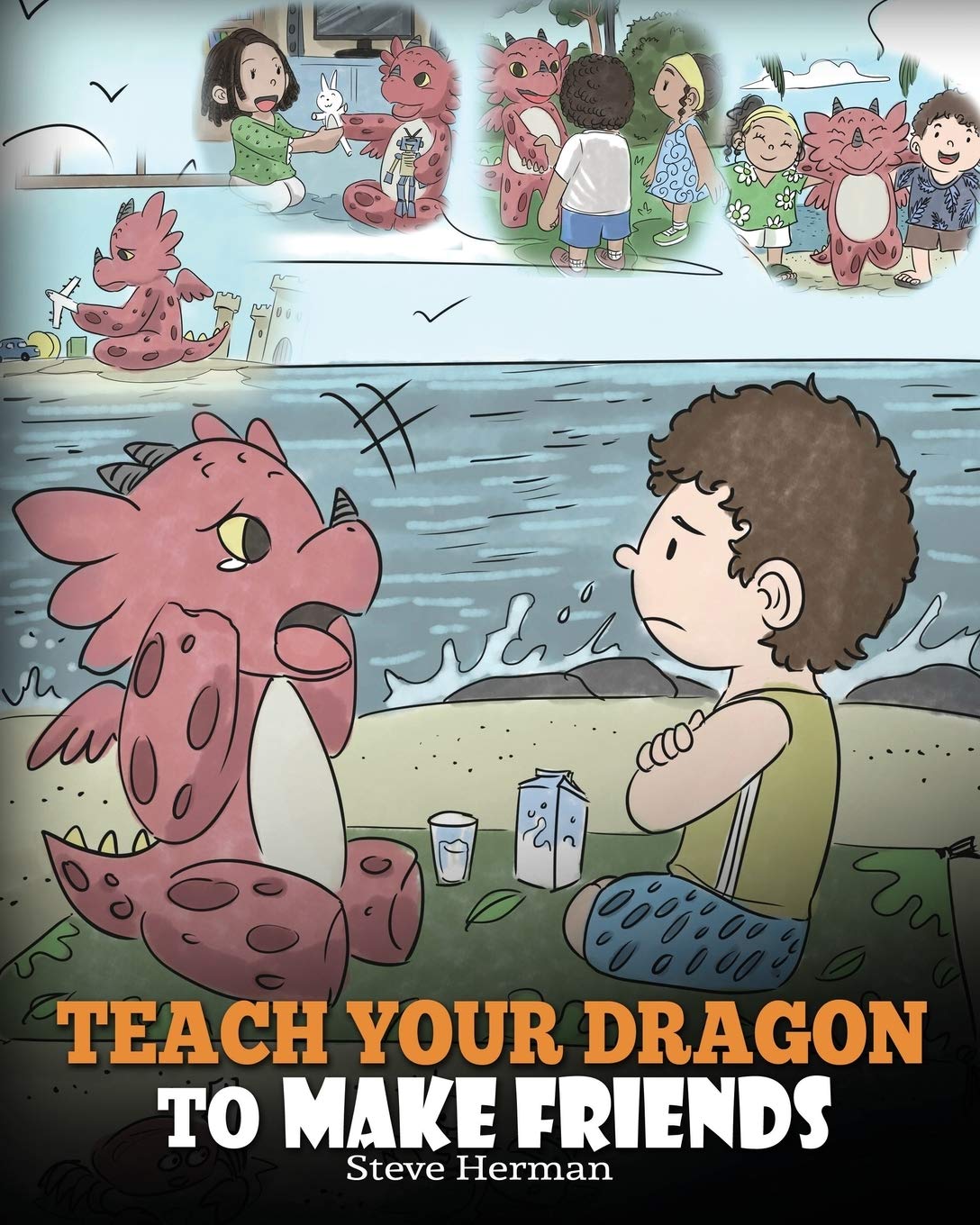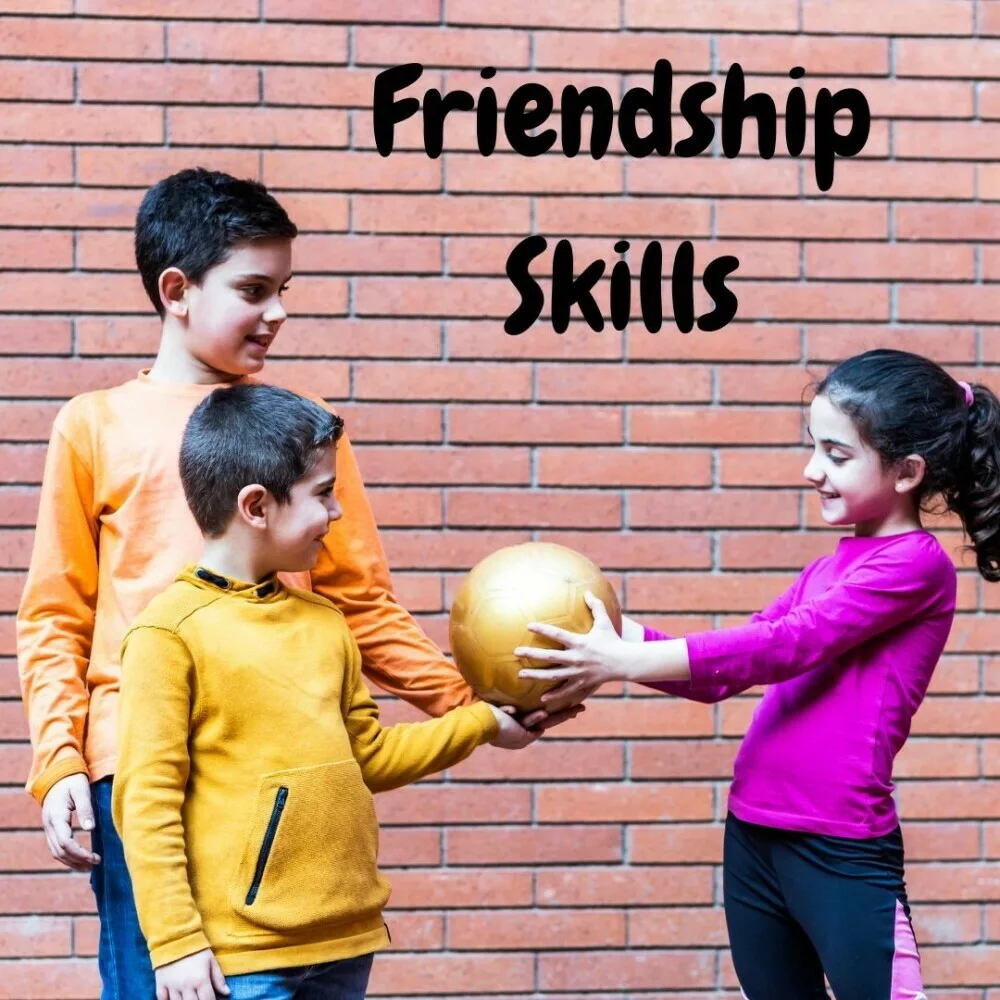
Friendships are much more than just playdates and shared toys for children; they’re foundational to a child’s emotional and social maturation and overall happiness. When I observe my child interacting with others, I see skills and values in action that will serve them for a lifetime. Friendships help build self-esteem, teach empathy, and foster communication skills.
Beyond immediate happiness, these early bonds can predict a child’s future well-being. Studies highlight that children with healthy friendships tend to display higher levels of confidence as they grow. Not only do these relationships serve as a practice ground for social norms, but they also offer support and understanding from peers.
As an elementary school counselor, I work with children in small groups or in pairs to help them learn basic friendship skills. I also consult with families and offer suggestions to them on ways they can help their children develop strong social skills. I was just explaining to a parent the other day that the skills children need to develop to interact positively, negotiate misunderstandings, solve problems, cooperate and behave in a way that enables them to maintain friendships, are like building blocks. There are so many intricate skills involved, which is why children need plenty of opportunities to play, make mistakes, work through difficulties, and continue learning. The more chances they have to play with other children, the more their friendship skills will be refined and strengthened.
Research by the American Psychological Association has shown that positive social interactions in early childhood can influence social success in later years. What may seem like simple playground chatter could lay down the foundations for interpersonal skills that last well into adulthood.
With this in mind, it becomes clear why guiding a child on how to make friends is essential. Yet, it’s not just about making friends; it’s about making the right ones and maintaining those relationships. This journey starts with helping a child develop the art of conversation. Through effective communication, children can not only start but sustain lasting friendships. Here is a bulleted list of the skills your child needs to practice so they can become more proficient at making and keeping friends:
How to Teach Your Child Friendship Skills
- Provide opportunities for your child to practice the give-and-take of friendships with other children
- Roleplay at home to give your child the advantage of knowing some foundational skills
- Observe, with your child, other children at play and look for facial and bodily clues to how the children are feeling
- Teach your child the art of joining other children at play in appropriate ways
- Teach your child to be understanding and tolerant of differences
The Art of Conversation: Teaching Children Effective Communication Skills
Friendships often start with a simple conversation, yet it can be daunting for some children to initiate and maintain dialogue. I find that the key to easing this process is equipping children with effective communication skills. It’s not about scripting their every word but rather fostering a mindset of curiosity and openness.
Active listening is the cornerstone of any meaningful conversation. This means teaching your child to fully concentrate, understand, respond, and then remember what is being said. I like to encourage activities that hone these skills, such as storytelling or play-acting. When I work with children in pairs, I guide them in playing something that’s open-ended, such as creating a dinosaur land or playing house. I let them play freely and only step in when they need some coaching. For instance, one child might say, “Let’s put the t-rex over here” and then the other child might grab the t-rex and say “No, it goes here!” This is when I step in and help them learn to compromise. I’ll ask them to start over and listen to each other. I’ll coach one child to ask, “Where would you like to put the t-rex?”, then I’ll encourage them to listen and have the other child ask the same thing. If they want to do different things, they can either choose a different location they both agree on, or I’ll have them do “rock-paper-scissors” to determine which option they’ll choose.
While the children are playing and finding ways to work through their differences of opinion, I also praise them when they’re cooperating and playing well together. Some kids have not had enough opportunities to practice the give-and-take of play. They just need to learn that cooperation is much more fun than “winning” and getting their way all the time.
Guide Your Child in Practicing Friendship Skills
When I work with small groups, we often practice pairing up and talking about things they like to do. One student will describe their favorite video game, while the other student listens. Then the other student is tasked with paraphrasing back what they heard. Then they switch and do the same thing again. This does not come naturally to many children. They want to jump in and talk about what they like without listening to the other child. It’s very important that they have chances to practice this very foundational skill. You can practice this at home with your child too. A great game for the family, and something I use often, is the Conversation Cards for Families. There are 600 questions that kids really enjoy answering.
 I also recommend practicing open-ended questions with your child throughout the day. These are questions that require more than a yes or no answer and encourage a fuller, more meaningful exchange. ‘What do you think about this game?’, ‘How did that make you feel?’ or ‘What was the best part of your day?’ can help your child strengthen their communication skills.
I also recommend practicing open-ended questions with your child throughout the day. These are questions that require more than a yes or no answer and encourage a fuller, more meaningful exchange. ‘What do you think about this game?’, ‘How did that make you feel?’ or ‘What was the best part of your day?’ can help your child strengthen their communication skills.
AFFILIATE LINK DISCLOSURE:
Here’s a little transparency: Our website contains affiliate links. This means if you click and make a purchase, we may receive a small commission. Don’t worry, there’s no extra cost to you. It’s a simple way you can support our mission to bring you quality content.”
Consider role-playing different social situations with your child. This empowers them with the confidence they need when actual conversations take place. It means they’ve already had a ‘practice run’ at asking someone to play, complimenting a peer, or joining in a game.
Lastly, children need to learn to read and respond to social cues. This includes understanding body language, tone of voice, and facial expressions — all vital components of empathetic interactions. Picture books, and movies can be effective tools for pointing out and discussing these cues. Another great way to do this is to take your child to a park, eat a snack together, and watch other children playing. Ask your child to watch the bodies and faces of the other children. See if your child can guess when a child on the playground is unhappy or unsure. Make this into a fun “people watching” game.
Navigating Social Settings: Helping Your Child Join Groups and Activities
For children, entering new social environments can be as daunting as an adult starting a new job. It’s in these settings – playgrounds, classrooms, and sports teams – that they face the task of forming new friendships. I can suggest that guiding your child to look for groups or activities that align with their interests is the first step. It makes the daunting task more approachable, as shared passions can be incredible icebreakers.
I love to read the story Teach Your Dragon to Make Friends. Children under 10 really enjoy the Teach Your Dragon book series.

Once an activity is chosen, guiding your child on how to approach a group can be crucial. A simple introduction or a shared activity can ease them into a new friendship circle. Remember, it’s important that your child understands that every interaction won’t always lead to friendship, but it’s the act of reaching out that counts. I recommend practicing phrases at home that they can use to break the ice.
Inclusiveness is another key aspect of building friendships. Encourage your child to embrace diversity and the idea that everyone has something unique to contribute. This mindset not only helps in widening their social circle but also enriches their own experiences. Teach them to be the child who invites others to join in, thus creating a positive feedback loop that further enhances their social opportunities.
Finally, the fear of rejection can often hold children back. It’s my role to help them understand that it happens to everyone. Learning to cope with ‘no’ is part of developing resilience. My advice is to encourage your child to keep trying and not to take rejection personally. By doing so, they develop the courage to step into new friendships and diverse social situations with confidence.
Maintaining and Deepening Friendships: Fostering Long-Term Relationships
Now that your child has taken the brave steps into building new friendships, it is critical for them to learn the skills needed to maintain and deepen these relationships. Consistency is key. I emphasize the importance of your child being a reliable friend who is present not only during the fun times but also when times get tough. Show them that sticking through thick and thin is what forges the strongest bonds.
Trust and honesty are the foundation of any lasting friendship. I guide you on nurturing these attributes in your children by being open about your feelings and encouraging them to do the same, thereby building a secure environment where their friends feel valued and respected.
It’s inevitable that friends will face conflicts. I provide strategies for teaching your child conflict resolution skills. Whether it’s a small argument over a toy or differing opinions, learning how to communicate effectively and apologize when necessary is crucial for sustaining friendships.
Lastly, don’t forget to celebrate the milestones. Whether it’s throwing a small party or just acknowledging the achievement of a friend, these actions show your child the joy of mutual growth and the beauty of sharing life’s journey with others.

